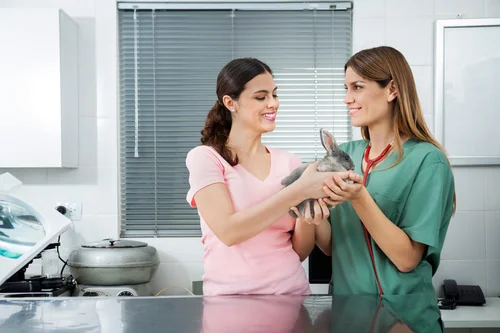When it comes to caring for our pet rabbits, making informed decisions about their health and welfare is paramount. One of the decisions rabbit owners face is whether to spay or neuter their pets. This blog will explore the benefits of spaying and neutering rabbits, dispel common myths, and offer guidance on how to ensure the best care for your rabbit. Remember, for personalized advice and service, the Avian and Exotic Animal Hospital of Louisiana is just a phone call away at (504) 455-6386.


The Importance of Spaying or Neutering Your Rabbit
Spaying and neutering are surgical procedures that prevent rabbits from breeding. Beyond the obvious benefit of population control, these methods offer significant health and behavioral benefits.
- Health Benefits: Spaying a female rabbit (doe) can virtually eliminate the risk of uterine and ovarian cancer, a common and often fatal disease in older females. Early spaying will eliminate or at least greatly reduce the risk of mammary cancer. Neutering a male rabbit (buck) reduces the risk of testicular cancer and other health issues related to the reproductive system.
- Behavioral Advantages: Unneutered rabbits may exhibit aggressive and territorial behaviors, including biting and barking. Neutering reduces these behaviors, making rabbits calmer and easier to handle. Spaying and neutering can also make litter training easier, as it reduces the urge to mark territory.
- Longer, Happier Life: Spayed and neutered rabbits tend to live longer, healthier lives. They are less likely to exhibit destructive behavior and get along better with other rabbits, leading to a happier, more social life.
Understanding the Method
- Pre-Surgical Assessment: Before surgery, your rabbit will undergo a thorough health check to ensure they are fit for the procedure. Preoperative blood tests may be recommended to check for any underlying health conditions that may complicate surgery.
- The Surgical Process: Spaying involves removing the female rabbit’s uterus and ovaries, while neutering involves removing the male rabbit’s testicles. Both procedures are performed under general anesthesia, and in modern veterinary practices, are considered safe with relatively quick recovery times.
- Post Surgical Care: After surgery, your rabbit will need a quiet place to recover. Follow-up care is important, including monitoring for any signs of infection or complications and making sure your rabbit is eating and drinking. Pain management is also an important part of postoperative care. In some cases, medications may be given to reduce pain or discomfort after surgery.
When to Spay or Neuter
Timing is an important factor in the decision to spay or neuter a rabbit. In general, rabbits can be safely spayed or neutered at 4 to 6 months of age, but the exact time can vary depending on the breed and size of the rabbit. Early spaying and neutering not only maximizes health benefits but also helps prevent the onset of unwanted behaviors associated with maturity.
Choosing the Right Veterinary Care
It is important to choose a veterinarian with experience in rabbit surgeries. The veterinarians at the Avian and Exotic Animal Hospital of Louisiana have more than 40 years of experience caring for both surgical and medical needs for rabbits, ensuring the highest standards of safety and care. Your chosen veterinary practice should offer comprehensive post-operative support. This includes advice on diet, activity levels, and how to monitor your rabbit for signs of distress or complications. Your veterinarian is a partner in your rabbit’s health. Feel free to ask questions or raise concerns. Whether it’s pre-surgery nerves or post-surgery care, we’re here to support you and your pet every step of the way.
The Myths vs. The Facts
There are several myths surrounding the spaying and neutering of rabbits, which may deter owners from opting for the procedure. Here, we address some common misconceptions and provide the facts.
Myth: Surgery is too dangerous for rabbits.
Fact: Although all operations carry some risk, advances in veterinary medicine have made spaying and neutering procedures relatively safe, with minimal risk when performed by experienced veterinarians.
Myth: My rabbit’s personality will change.
Fact: Although spaying and neutering can reduce aggression and territorial behavior, your rabbit’s unique personality will remain intact. In fact, many owners find that their rabbits become more affectionate and easier to interact with post-surgery.
Myth: It’s better to let my rabbit have one litter before spaying.
Fact: Allowing your rabbit to litter has no health benefits and only contributes to the overpopulation problem. Spaying before the first heat cycle offers the best protection against uterine cancer.
The Benefits of Spaying or Neutering Your Rabbit
Deciding to spay or neuter your rabbit is a responsible choice that can significantly improve the quality of life for you and your pet. Because the health, behavioral, and social benefits clearly outweigh the risks, this is a decision that requires serious consideration. For those ready to take the next step, or for anyone looking for more information, the Avian and Exotic Animal Hospital of Louisiana is here to help. Call us at (504) 455-6386 to discuss how we can support your rabbit’s health and happiness.


